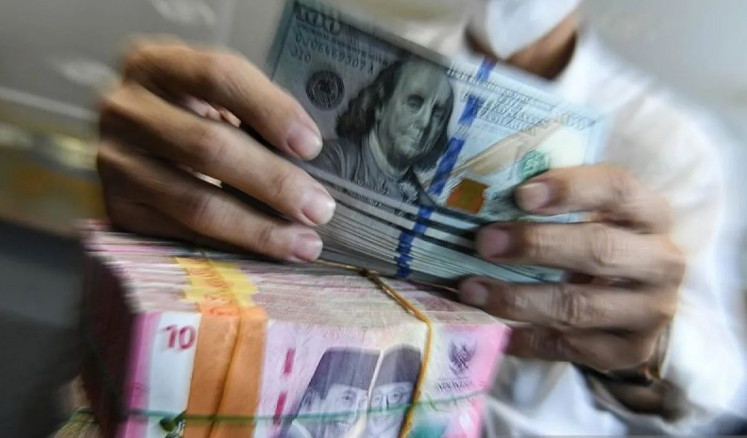Popular Reads
Top Results
Can't find what you're looking for?
View all search resultsPopular Reads
Top Results
Can't find what you're looking for?
View all search resultsConsumers warned about ATM scams
Money moment: Two customers draw cash at an ATM booth in Central Jakarta in this file photo
Change text size
Gift Premium Articles
to Anyone
Money moment: Two customers draw cash at an ATM booth in Central Jakarta in this file photo. JP/J. Adiguna
Alam Tronik, 20, panicked when his ATM card became stuck in the machine while he was withdrawing money.
Alam was confused about how to get his card out of the machine. A man who queued behind him at the ATM booth suggested Alam call the bank’s online service, pointing to a phone number printed on a sticker stuck to the machine.
Without suspicion, Alam immediately called the number and mentioned his personal account details and PIN upon the request of the person on other end of the phone.
He exited the booth.
After making the call, he was surprised when he returned to the booth to see the man behind him had entered the booth, withdrawing money from his account after hearing his PIN.
Alam then realized he had fallen victim to a fraud syndicate.
“I realized the man had deceived me. I called for help by shouting at the security officer and people around the booth,” Alam said, as reported by Warta Kota daily recently,
The culprit, later identified as Ganes Tumewu, was arrested and taken to the Jagakarsa Police in South Jakarta.
His two partners named Olivia and Yahrizal, who were also at the scene, were also arrested.
Police officer at the subprecinct revealed that when Ganes trapped Alam at the booth, Olivia and Yahrizal waited in a car parked nearby.
The number Ganes told Alam to call was a fake hotline number. It was Olivia disguised as a hotline service officer who answered Alam’s call, asking him to mention the PIN.
According to the police, the three covered the bank’s original call center sticker, replacing it with another sticker with the fake call center number on it.
The forged number was their cellular phone number.
The culprits admitted to the police that they would insert a wooden lighter into the card slot to block the victim’s card from getting out of the machine.
When the victim panicked, one of the culprits — who pretended to line up behind the victim in the ATM booth, would offer to help the victim by suggesting he call the fake number.
Meanwhile, another culprit was ready to answer the call by pretending to be a bank officer, asking for the victim’s PIN, saying “the PIN was needed to block the account from any further transaction”.
The bogus officer would tell the victim not to panic because the victim’s account had been blocked temporarily and said that the victim could leave the booth.
This gave the perpetrators time to carry out their mission.
They would remove the match and retrieve the victim’s card out of the machine. They could then easily steal money from the victim’s account by inserting the card again, since they had secured the PIN number.
Public relations head of Bank Mandiri, Iskandar Tumbuan, said the bank had received a number of reports from customers who had fallen victim to similar situations.
“The perpetrators have modified the machine to make sure the victim’s card gets stuck. As they are panicked, the victims will do as they are told, even calling the fake call center number,” Iskandar said.
Besides fake call center numbers, the police warned people of various modus operandi used by ATM fraud syndicates to trap their victims.
Head of the fiscal, monetary and budget reserve at the city police, Adj. Sr. Comr. Bahagia Dachi, said another scam to be wary of was that the perpetrator trapped people who sold their properties, for example cars or houses, by pretending to be would-be buyers.
“The perpetrator pretends to be interested in buying a property and asks for the victim’s account number to transfer money into as a down payment.
“Then, he will ask the victim to go to the ATM to check whether the money has been received.
“After hearing the victim say that they have not yet received the money, the perpetrator will use the opportunity to ‘guide’ the victim to push the ATM buttons.
The victim often gets confused and will just follow the instructions. Eventually, the victim’s money will be transferred to the criminal’s bank account,” he said.
Dachi said the police found it difficult to solve some cases because the victims did not meet face-to-face with the culprits.
“And when we track them down we find that their personal information is wrong and their phones are no longer active.”










